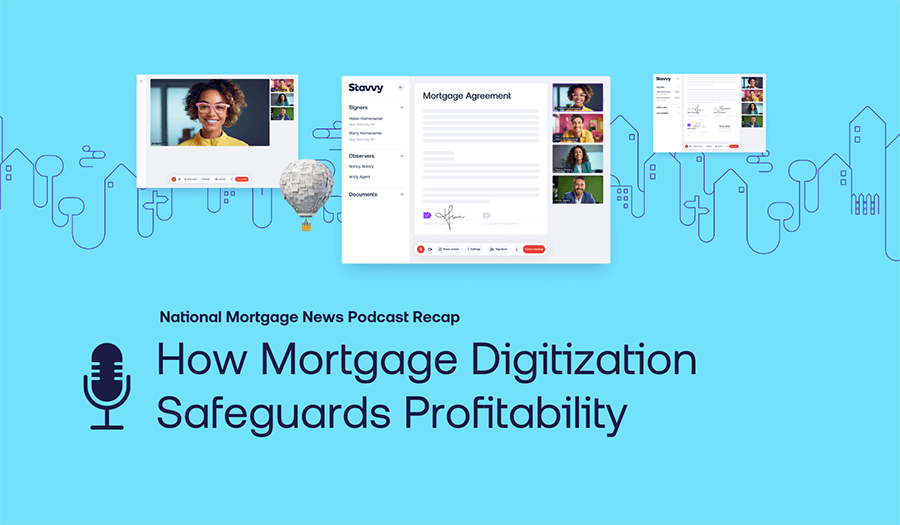The housing market has been at the epicenter of uncertainty recently, especially because mortgage rates nearly doubled from a modest 3.22% in early 2022, leaving the industry to wonder: What’s coming next?
Without a crystal ball, we secured the next best option: a leading economist and expert. Doug Duncan is senior vice president and chief economist at Fannie Mae and was named one of the most powerful people in real estate by Bloomberg Businessweek. He’s an expert on forecasting housing, economic, and mortgage market activity.
Duncan believes that various trends, including lingering supply issues from the Great Recession and Millennials entering the market, are fueling changes. He joined Kosta Ligris and Angel Hernandez on Stavvy’s Finside Chats® podcast to answer pressing questions, including whether 2023 will be a better year to buy a home and if a housing market crash and recession are on the horizon.
In this episode of Finside ChatsⓇ, you’ll learn more about:
- Predictions on whether real estate prices are expected to drop, and if so, by how much
- Why housing supply remains tight, despite the continued increase of mortgage interest rates
- Whether a recession will likely hit during 2023 and, if so, the potential severity
Listen now: Housing Market Predictions According to Fannie Mae’s Leading Economist
Will home prices drop?
As the mortgage industry headed into 2023, a common prediction was that housing prices would decrease by approximately 10%.
Duncan doesn’t disagree; he anticipated a decline in the ballpark of 7% to 10%. But as the year progressed, the market threw curveballs, including strong demand despite rising mortgage rates.
“The resilience of demand, even with a significant run-up in interest rates, led us to revise prior forecasts,” says Duncan. “So now we expect maybe half of what we thought before in terms of a housing price decline – something around a 5% decline over the forecasted 24-month period.”
Furthermore, Duncan anticipates that the federal government will stick with higher mortgage rates until it feels confident it has a firm handle on inflation.
“I wouldn’t expect a lot of downside on interest rates soon,” says Duncan. “And that means that affordability will be challenged for a period of time, and people with the best credit and some available reserves will have an advantage in the marketplace.”
Will mortgage rates go down?
According to Duncan, real estate market conditions can be traced back further than many realize. The supply issues we observe today began taking root during the Great Recession.
“Basically, we went from building 2.2 million housing units to about 400,000 in the 2007 to 2009 downturn,” says Duncan. “And we stayed at that level for three and a half years. But in the meantime, Millennials were coming of age and entered the demand side of the equation in the 2014 to 2015 period, with a very low developing supply. And that led to significant price appreciation.”
However, these weren’t the only factors putting pressure on the market. According to Duncan, the rise of women’s participation in the workforce doubled the number of household incomes, and housing prices came to expect two incomes to qualify for a mortgage.
Then, the pandemic hit. As more workers went remote, many Boomers simultaneously downsized their homes. Before remote work, there were questions about who would buy the homes that Boomers would sell during a downsizing trend, with Millennials having fewer children. But suddenly, a four-bedroom house made sense for Millennials with two home offices, a room for a child, and one for the parents.
And, of course, remote work also meant an outflow of people from many of the larger cities. “Major metro areas, such as New York, Boston, Washington, D.C., and San Francisco saw more of an outflow of households than did some others like Atlanta or Dallas,” says Duncan. “So it’s important to understand the relationships between work and living space in the local market that you’re operating in.”
So, will 2023 be a better year to purchase a home? Maybe, with home prices expected to decline around 5%. But demand continues to remain strong, so improvements may be modest.
Is the housing market going to crash?
As the mortgage industry closed out in 2022, economists placed a 70% chance for a U.S. recession in 2023, more than double the odds six months prior. With the federal government steadily increasing rates, it was expected that new and existing home sales would begin to slow.
“April, a year ago, we put into our forecast a recession in 2023 – a mild recession,” says Duncan. “We haven’t changed that view, but we have pushed it out to the third quarter being the starting point.”
However, Duncan doesn’t anticipate a large pickup in delinquencies or foreclosures because many households are locked into very low mortgage rates and are willing to go to great lengths to keep them.
“The share of outstanding mortgages that are more than a full percentage point below current market rates is in the 85% to 90% range,” says Duncan. “And the share that is more than two percentage points below the current market is somewhere in the 65% to 70% range. People who have locked in those rates are going to hold on to them and go to great lengths to retain that advantageous financing.”
As the federal government fights inflation, there is also the potential risk of a “black swan” event. The Silicon Valley Bank event previewed what could happen to pivot the market conditions further, fuel a larger housing market slowdown, and shift housing market 2023 predictions.
Tips for buying in today’s market
Uncertainty and a U.S. housing market contraction may persist into the coming months, but despite what the market does, Duncan has a few tips.
“If you have a household budget, and the house that you’re looking at suits your needs and is within that budget in today’s mortgage market, then deciding to buy that house often makes sense,” says Duncan. “That’s because you understand the risks you are taking in regard to your financial capabilities.”
Duncan also cautions against inadvertently moving from homebuyer to home speculator. “If your decision is predicated on ‘I think interest rates are going to drop’ or ‘I think housing prices are going to change,’ now you’ve moved from being a purchaser who intended to be a homeowner into, in some sense, being a speculator.”
He also recommends that homebuyers shop for a mortgage. “I think I’ve had five different mortgages,” says Duncan. “And each time I’ve talked to a minimum of three lenders, I’ve always ended up with a better deal than the first offer.”
The mortgage industry should also consider the potential impacts of increased shopping activity and decreased volumes, as they may find themselves with tighter competition and more discerning buyers.
Recession predictions for 2023
While a true crystal ball doesn’t exist, the data always tells a story about the future. And looking at the data is what Duncan does best. But with any prediction, when the variables change, so do the outputs.
“Every human being out there puts their head down somewhere every night on a piece of real estate,” says Duncan. “So it’s always part of the human story. And so part of what we do is think about people, and part of what we do is think about properties. Each has different data sets, and we’re always trying to understand the intersections between people and properties.
Learn more about how the  is taking real estate beyond documents.
is taking real estate beyond documents.



![[Webinar Recap] Advancing Your Digital Default Servicing Strategy](https://blog.stavvy.com/hubfs/advancing-your-digital-default-servicing-strategy-blog-recap.png)